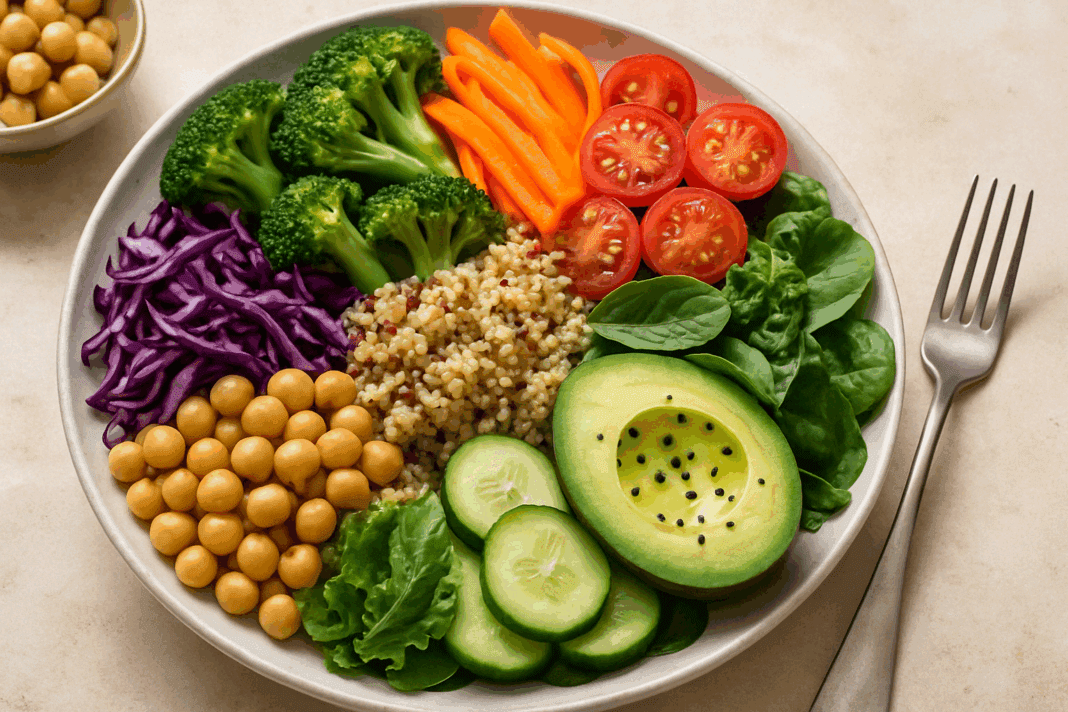Creating a calorie deficit is essential for fat loss, but doing it in a way that leaves you feeling energized and satisfied is the real challenge. The idea of losing weight by eating less often conjures images of endless hunger and deprivation. Fortunately, with the right strategy, it’s possible to reduce calorie intake without feeling constantly hungry or sacrificing nutritional quality. In fact, understanding what to eat for a calorie deficit to lose weight safely is the foundation of long-term success on any healthy eating plan.
You may also like: Plant Based Diet vs Standard American Diet: What the Latest Studies Reveal About Long-Term Health Outcomes
This guide is grounded in the principles of whole-food, plant-based nutrition and delivers evidence-based strategies for achieving a calorie deficit diet for fat loss. We’ll explore how to eat less food without feeling deprived, how to cut calories while still meeting your body’s needs, and how to shift your habits to naturally support fat loss. We’ll also examine the role of popular trends like the keto diet vs low carb diet, and whether a ketogenic approach is sustainable or beneficial long term.
Understanding the Calorie Deficit: Why It Works (and What It Doesn’t Mean)
At its most basic, a calorie deficit means consuming fewer calories than your body uses in a day. When done consistently, this causes your body to use stored fat as energy, leading to weight loss. But does eating less make you lose weight automatically? Not quite. While it’s true that you will lose weight by eating less if you’re in a deficit, how you achieve that matters immensely.
The quality of your food, nutrient density, fiber content, hydration, sleep, and stress levels all impact how your body responds to a calorie deficit. Crash diets or extreme restriction might create short-term results, but they also increase the risk of rebound weight gain. More importantly, they often lead to loss of lean muscle mass, hormonal disruption, and persistent hunger.
That’s why asking “does eating less help lose weight?” requires a nuanced answer. Yes, but only when the reduction in calories is paired with a balanced diet that supports satiety, metabolism, and overall health. Sustainable fat loss comes from combining a modest calorie deficit with strategic food choices that keep you full and nourished.
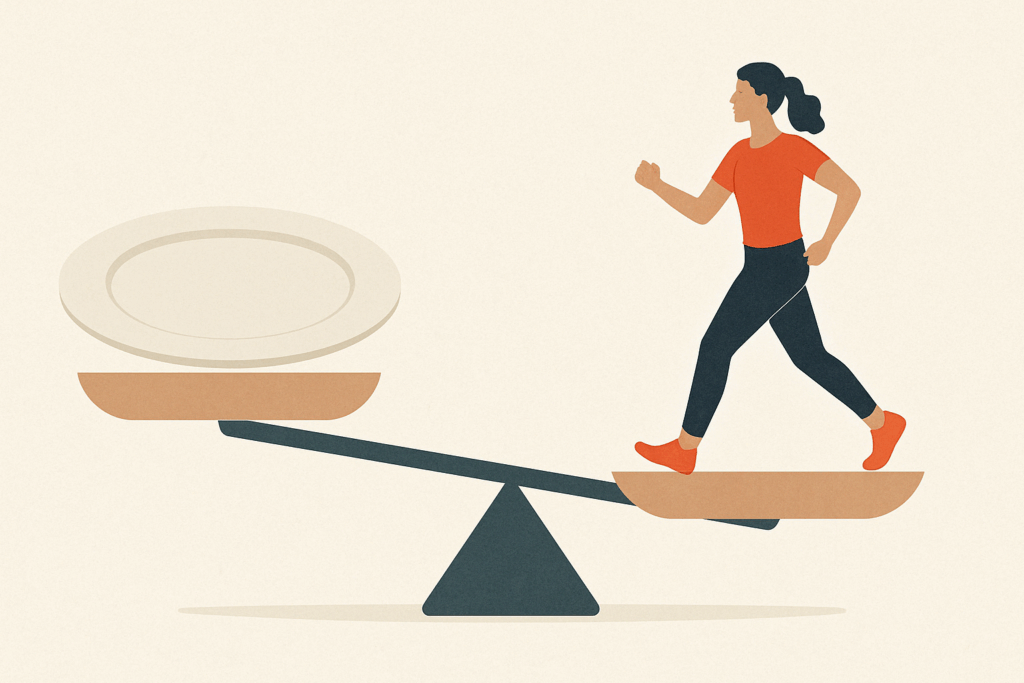
Satiety Science: The Secret to Eating Less Without Feeling Hungry
Hunger is not just about stomach emptiness; it’s driven by hormones like ghrelin and leptin, as well as the stretch of the stomach, the presence of fiber, protein, and fat, and even your emotional and psychological state. Foods that provide volume with fewer calories—like vegetables, fruits, legumes, and whole grains—play a powerful role in appetite regulation.
Fiber, in particular, has a profound effect on satiety. It slows digestion, regulates blood sugar, and helps the stomach feel full longer. High-fiber plant foods like lentils, oats, beans, apples, and leafy greens provide bulk without excessive calories. Protein also contributes to feeling satisfied and maintaining muscle during weight loss. For those on a plant-based diet, protein can come from tofu, tempeh, seitan, legumes, quinoa, and protein-rich vegetables.
When considering how to eat less calories without feeling hungry, the answer lies in whole, unprocessed plant foods that are naturally high in volume and nutrients but low in energy density. These foods allow you to eat larger portions without exceeding your daily caloric needs.
What to Eat for a Calorie Deficit to Lose Weight Safely
If your goal is to create a calorie deficit diet for fat loss, focusing on specific food categories can help streamline the process while improving your health. Start by building your meals around vegetables—especially leafy greens, cruciferous vegetables, and non-starchy options like cucumbers, zucchini, and bell peppers. These offer large portions for very few calories.
Add in whole grains such as brown rice, farro, or barley in moderate portions to provide lasting energy. Legumes like lentils, chickpeas, and black beans offer a trifecta of fiber, protein, and slow-digesting carbohydrates. Fruits are ideal for satisfying sweet cravings while contributing hydration and essential vitamins.
Healthy fats such as avocado, nuts, seeds, and olives should be included in controlled amounts. Though higher in calories, these foods help keep you satisfied and are critical for nutrient absorption. To ensure adequate protein, include tempeh, tofu, edamame, and protein-fortified plant milks or powders when needed.
Ultimately, the best calorie deficit diet isn’t one that excludes food groups or demands perfection—it’s one that centers on nutrient-dense, satisfying foods that you enjoy and can sustain.

Does Eating Less Food Make You Lose Weight—or Just Feel Deprived?
It’s a common question: can eating less make you lose weight, and if so, will eating less help you lose weight sustainably? Research supports the idea that a calorie deficit is necessary for fat loss. But the manner in which you reduce calories can determine whether the results are lasting—or short-lived.
Choosing to eat less processed food, rather than simply reducing meal size, can make a substantial difference. Ultra-processed foods are designed to override satiety signals, making it easy to consume excess calories without realizing it. Shifting to whole foods—especially those high in fiber and water content—naturally lowers calorie intake while enhancing satisfaction.
This is where the question “does eating less food make you lose weight?” becomes more complex. You can eat fewer calories and still feel full if the food is structured to work with your biology, not against it. Eating less doesn’t mean starving—it means eating smarter.
How to Cut Calories Without Feeling Like You’re Dieting
The process of how to cut calories without slipping into restriction mentality is as much about mindset as it is about method. One strategy is “volume eating,” which involves loading meals with low-calorie, high-bulk foods like vegetables, mushrooms, zucchini noodles, and broth-based soups. This allows you to fill your plate (and your stomach) while consuming fewer calories.
Another approach is food swaps. Replace high-calorie spreads and oils with hummus or avocado. Use air poppers instead of oil when making popcorn. Choose unsweetened plant-based yogurt over sugary varieties. By focusing on what you can add—rather than what you must remove—you build a positive relationship with food.
Cooking at home is another powerful tool. Restaurants and takeout often contain hidden calories in sauces, oils, and portion sizes. Preparing your own meals gives you full control and helps you stay aligned with your calorie deficit goals.
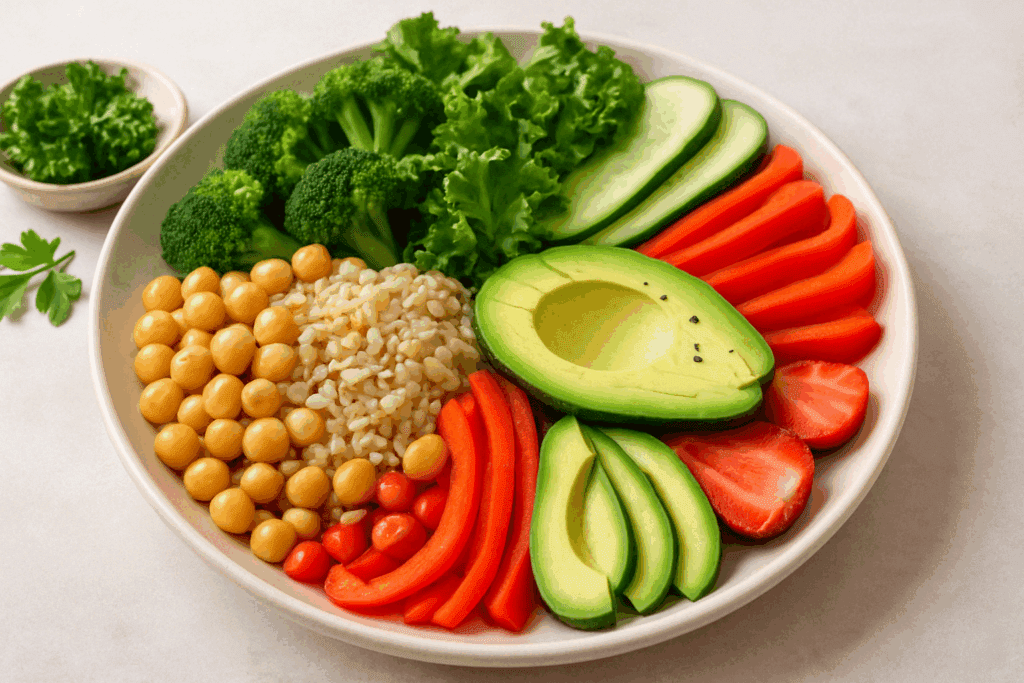
Is Keto a Low Carb Diet—and Is It Right for Long-Term Weight Loss?
Many people ask: is keto a low carb diet, and is keto a good diet for fat loss? Technically, yes—the ketogenic diet is an ultra-low carbohydrate, high-fat approach that triggers a metabolic state called ketosis. But not all low carb diets are ketogenic. The key distinction in the keto diet vs low carb diet debate is the severity of carb restriction.
A typical low carb diet might allow 50 to 150 grams of carbs per day, emphasizing lean proteins and vegetables. A ketogenic diet, by contrast, restricts carbs to around 20 to 50 grams per day—often eliminating entire food groups like fruits, grains, and legumes.
While keto can create a rapid initial weight drop due to water loss and reduced appetite, the question of is a keto diet sustainable long term deserves scrutiny. Many find it difficult to maintain, and research suggests that long-term adherence may be poor due to social, cultural, and nutritional limitations. Moreover, keto may be incompatible with a whole-food plant-based lifestyle, as it restricts many fiber-rich, health-promoting foods.
The Best Calorie Deficit Diet: Whole-Food, Plant-Based and Naturally Satisfying
So what is the best calorie deficit diet for health and sustainable weight loss? One backed by evidence, abundant in fiber, and rooted in real food. Plant-based eating meets these criteria exceptionally well. Studies consistently show that diets based on whole plant foods support weight loss, metabolic health, and long-term success.
By emphasizing legumes, vegetables, whole grains, and fruits, plant-based diets promote satiety, reduce caloric intake naturally, and improve insulin sensitivity. Unlike keto, which can feel restrictive, plant-based eating offers variety, flavor, and freedom. And for those wondering “does eating less lose weight if you’re eating healthy foods?”—yes, especially when the food supports your body’s hunger and fullness cues.
There’s also a profound psychological benefit. Rather than focusing on restriction, a plant-based calorie deficit approach focuses on abundance—of nutrients, of flavor, of satisfaction. It shifts the narrative from deprivation to empowerment.
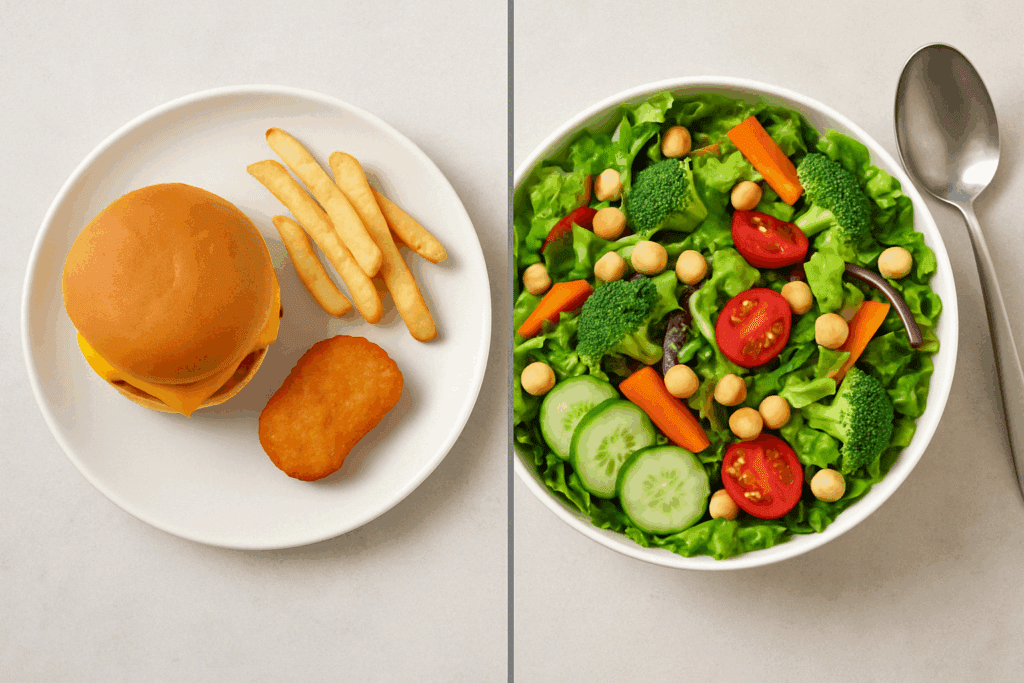
Can Eating Less Help You Lose Weight If You’re Already Healthy?
Many health-conscious individuals wonder, “can eating less help you lose weight even if you’re already at a healthy weight?” The answer lies in your goals. If body recomposition or performance improvement is your aim, eating slightly less—combined with strength training—can help reduce body fat while preserving lean mass.
However, if your current weight is stable and within a healthy range, it may be more beneficial to focus on food quality and metabolic health than further calorie reduction. Energy balance is dynamic and influenced by sleep, movement, and hormones—not just food intake.
Even when weight loss isn’t a goal, learning how to eat less calories without sacrificing nutrition can prevent weight gain, improve longevity, and enhance energy levels. It’s not about eating less—it’s about eating right.
Keto Diet vs Low Carb Diet: Which Supports a Sustainable Calorie Deficit?
When comparing the ketogenic diet vs low carb diet for long-term success, sustainability becomes the central question. A strict keto diet often lacks dietary fiber and can be difficult to maintain. Is keto no carbs? Not quite—but it’s very close. That ultra-low carbohydrate model can restrict beneficial food groups that support gut health, immunity, and fullness.
A moderate low carb diet, on the other hand, may be easier to maintain. By including small portions of whole grains, fruits, and legumes, it avoids the rigidity of keto while still promoting stable blood sugar and reduced appetite. This makes it more compatible with a whole-food plant-based framework.
When choosing between the two, consider which approach aligns with your lifestyle, ethics, and ability to sustain the changes long term. Is keto a good diet if you love fruit, beans, and oats? Probably not. But a low carb plant-based diet can still offer the benefits of appetite regulation and fat loss without the extreme restriction of keto.
Will You Lose Weight by Eating Less if You’re Active?
Physical activity changes the equation. Active individuals have higher calorie needs, so even a small reduction in intake can create a meaningful deficit. But activity also increases hunger cues, making food quality and timing even more important.
To maintain performance and energy while losing fat, aim to match meals with your activity level. After exercise, prioritize meals that contain both complex carbohydrates and protein to aid recovery and prevent muscle loss. Planning satisfying, whole-food meals around your workouts ensures you can eat less without feeling under-fueled.
This is especially important for those exploring a calorie deficit diet for fat loss in conjunction with fitness goals. Proper planning helps prevent energy crashes, mood swings, and unsustainable cravings.
How to Eat Less Calories Without Losing Nutrients
One common pitfall of eating less is missing out on key nutrients. Cutting calories should never come at the cost of vitamins, minerals, or macronutrient balance. That’s why whole plant foods are ideal—they’re packed with micronutrients relative to their calorie content.
A diet rich in dark leafy greens, colorful vegetables, legumes, whole grains, nuts, and seeds ensures that even when calories are reduced, nutrient density remains high. Including fortified foods or supplements for B12, vitamin D, and omega-3s is also essential on a plant-based plan.
If you’re asking “can u lose weight by eating less and still be healthy?” the answer is yes—when your meals are built with nutritional integrity. Skipping processed diet foods and focusing on real, whole ingredients makes all the difference.
Is a Keto Diet Sustainable Compared to Plant-Based Eating?
Long-term success in fat loss is rooted in sustainability. Is a keto diet sustainable for most people? Evidence suggests not. While some can maintain it short term, many struggle with the exclusion of fiber-rich plant foods, social eating limitations, and potential nutrient deficiencies.
Plant-based diets, by contrast, are flexible, inclusive, and supportive of long-term health. They encourage variety, celebrate abundance, and foster a healthier relationship with food. For most people, the best calorie deficit diet is one they can live with—and love—for life.

Frequently Asked Questions: How to Eat Fewer Calories Without Feeling Hungry
1. Will you lose weight by eating less even if you don’t exercise?
Yes, you will lose weight by eating less if you maintain a consistent calorie deficit. However, it’simportant to understand that exercise plays a vital role in preserving lean muscle mass, enhancing metabolic health, and improving body composition. Without physical activity, the body may lose both fat and muscle, which can reduce metabolic rate over time. For those who rely solely on calorie restriction, nutrient density becomes even more critical to avoid deficiencies. A calorie deficit diet for fat loss should be paired with intentional meal planning to meet protein, fiber, and micronutrient needs.
2. Does eating less food make you lose weight faster?
While it might seem logical that eating far less would result in faster weight loss, extreme caloriereduction often backfires. The body adapts to severe deficits by lowering metabolic rate, increasing hunger hormones, and preserving fat stores. This phenomenon is part of the body’s natural survival mechanism. Instead of slashing calories drastically, adopting a sustainable approach that teaches you how to eat less calories while feeling satisfied is more effective in the long run. Fast weight loss is rarely lasting weight loss, and gradual changes support long-term success.
3. Can eating less help you lose weight if you’re already thin?
If you’re already lean and looking to lose additional body fat, a calorie deficit must be approachedcarefully. You can lose weight by eating less, but the margin for error becomes smaller when you’re close to your ideal body weight. In these cases, the best calorie deficit diet focuses on slight reductions in energy intake while maximizing protein to protect lean mass. Psychological stress, hormonal fluctuations, and micronutrient gaps are more likely when intake dips too low. This is why learning how to cut calories mindfully is key for people at lower body fat percentages.
4. What are some advanced strategies for how to eat less calories without tracking every meal?
Advanced strategies include practicing intuitive eating with a focus on energy-dense foods, using theplate method, and structuring meals around vegetables and legumes. For example, eating a large salad or soup before your main course can lead to lower overall intake. Swapping oils and calorie-dense dressings for flavorful vinegars, herbs, and spices helps cut calories while keeping meals enjoyable. Studies suggest that environmental cues—like eating on smaller plates or avoiding screens while eating—also influence how much we consume. These habits train your body and mind to eat less food naturally, without relying on calorie counting.
5. Does eating less cause weight loss if you have a slow metabolism?
Yes, but the pace may be slower. While metabolism plays a role in how many calories you burn, evena slow metabolism will respond to a sustained calorie deficit. The challenge is identifying the appropriate intake that supports gradual fat loss without compromising energy or health. In this case, what to eat for calorie deficit to lose weight safely should prioritize high-volume, low-calorie foods like leafy greens, legumes, and whole grains. Slow metabolisms may also benefit from strength training and protein-rich meals to enhance thermogenesis and muscle maintenance.
6. Can eating less make you lose weight if your hormones are out of balance?
Hormonal imbalances such as insulin resistance, hypothyroidism, or PCOS can complicate weight loss,but that doesn’t mean it’s impossible. You can still lose weight by eating less, but success may require more precision and patience. In these situations, focusing on blood sugar stability through balanced meals—especially those rich in fiber and protein—is critical. Understanding how to cut calories without triggering excessive hunger or blood sugar crashes helps improve adherence. Always consult a healthcare provider to rule out underlying conditions before starting a calorie deficit diet for fat loss.
7. What role does meal timing play in how to cut calories successfully?
Meal timing can support appetite regulation and energy balance, even when overall calories remainunchanged. Eating earlier in the day—particularly a protein-rich breakfast—may reduce total daily intake and improve satiety. Skipping meals often leads to rebound hunger and overeating later, which can sabotage progress. Rather than obsessing over intermittent fasting or rigid schedules, consider how eating patterns affect your ability to stay in a calorie deficit. Strategic meal timing can make it easier to eat less food without experiencing intense hunger.
8. Does eating less help lose weight even if your diet is already healthy?
Even healthy eaters can unintentionally consume too many calories, especially from nuts, oils, andsmoothies. While food quality is essential for health, weight loss still hinges on energy balance. If you’re consuming more than your body uses, you won’t lose weight—regardless of how nutritious your meals are. In this case, learning how to eat less calories while maintaining nutrient density becomes a key strategy. Shifting portion sizes, reducing added fats, and enhancing volume with water-rich vegetables can make a healthy diet more calorie-conscious.
9. Will eating less help you lose weight in the long term if you occasionally overeat?
Consistency matters more than perfection. Occasional overeating won’t sabotage your efforts as longas you’re generally maintaining a calorie deficit. In fact, occasional high-calorie days can help reduce metabolic adaptation and support psychological flexibility. A flexible calorie deficit diet for fat loss may include higher-calorie meals during social events, balanced by lower-calorie days around them. Developing resilience and adaptability with food choices is more sustainable than rigid dieting—and helps reinforce that yes, will eating less help you lose weight, even if some days are off-plan.
10. Can u lose weight by eating less if you’re emotionally attached to food?
Emotional eating presents a unique challenge in creating a sustainable calorie deficit. Yes, can eatingless make you lose weight—but not if emotional eating consistently overrides your intentions. Developing emotional resilience, practicing mindfulness, and working with a therapist or coach can be crucial steps. Exploring non-food coping mechanisms like journaling, walking, or social support helps reduce the urge to eat in response to stress. Long-term success isn’t just about what to eat for calorie deficit to lose weight—it’s also about why and when you’re eating, and whether those choices align with your goals and emotions.
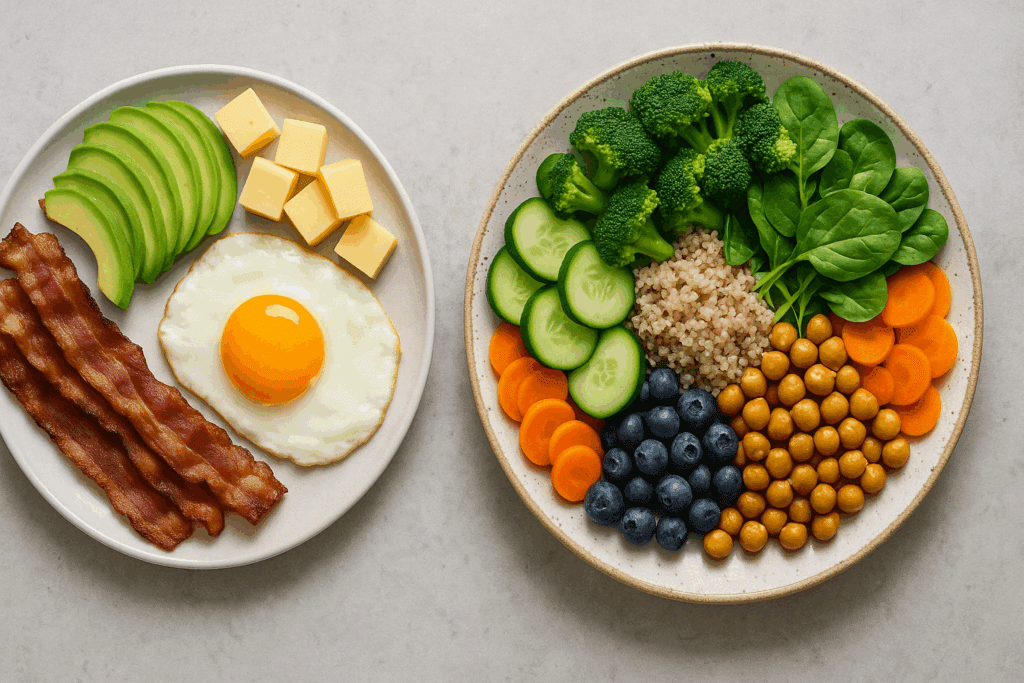
Conclusion: Eating Less Doesn’t Have to Mean Going Hungry—It’s About Eating Smart
So, will eating less help you lose weight? Yes—but only when done in a way that supports your physical, emotional, and nutritional needs. The best approach to creating a calorie deficit is not about restriction, but about smart, satisfying choices. By embracing whole, plant-based foods that are rich in fiber, water, and nutrients, you can naturally reduce calorie intake without experiencing chronic hunger or deprivation.
The answer to how to eat less calories lies in working with your body—not against it. Whether you’re exploring the keto diet vs low carb diet or finding a plant-based path that works for you, focus on sustainability, satiety, and satisfaction. When your meals leave you full, energized, and nourished, you’ll be far more likely to stay consistent and reach your goals. And in that consistency lies the key to lasting, healthy weight loss.
Was this article helpful? Don’t let it stop with you. Share it right now with someone who needs to see it—whether it’s a friend, a colleague, or your whole network. And if staying ahead on this topic matters to you, subscribe to this publication for the most up-to-date information. You’ll get the latest insights delivered straight to you—no searching, no missing out.

